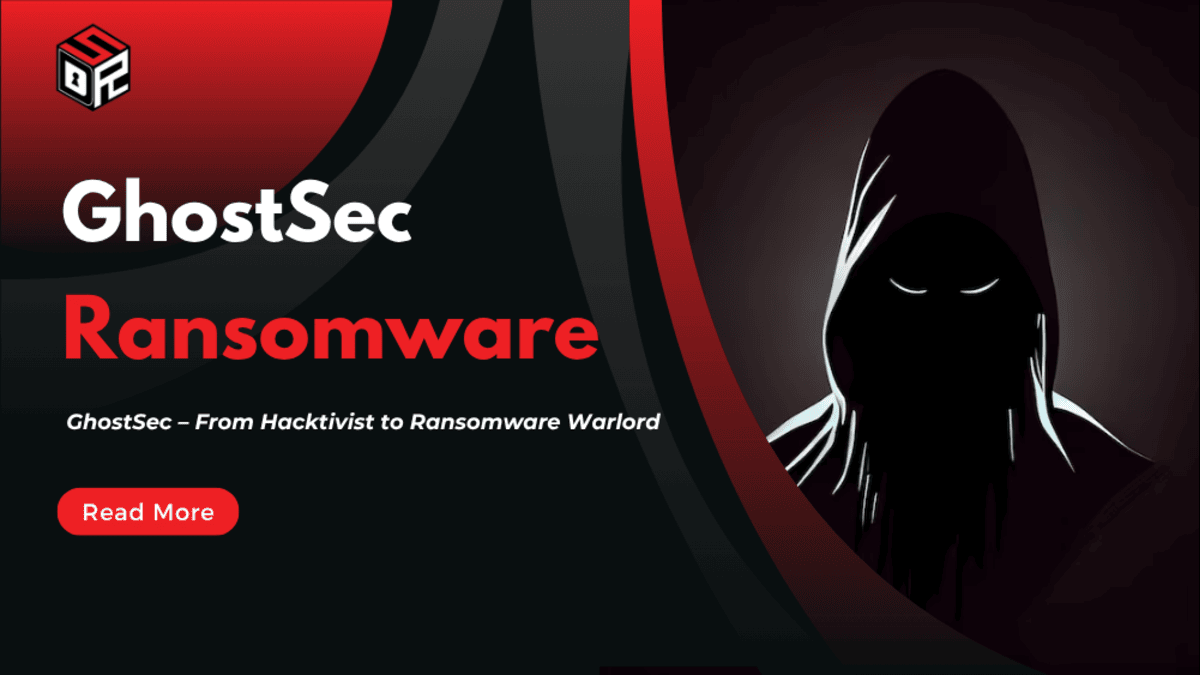Overview
GhostSec emerged in 2015 as a hacktivist offshoot of Anonymous, launching campaigns like #OpISIS and targeting extremist groups. Since late 2022, they’ve pivoted into financially motivated cybercrime through their Ransomware-as-a-Service (RaaS) known as GhostLocker, and in partnership with Stormous, operate double-extortion operations under STMX_GhostLocker. Their toolkit now includes website attack tools like GhostPresser and GhostSec Deep Scan, with activity tied to both hacktivism and profit-driven campaigns.
Known Aliases of GhostSec Ransomware
- GhostSecMafia
- GSM
- Ghost Security
- GhostLocker (ransomware name)
- STMX_GhostLocker (in collaboration with Stormous)
Country of Origin
Decentralized operations; associated activity and C2 infrastructure (e.g., Moscow-hosted servers) suggest Eastern European ties, but with hacktivist roots in Middle East influence .
Incident Timeline
| Date | Event |
|---|---|
| 2015 | GhostSec forms as part of Anonymous‑linked hacktivists, launching #OpISIS and counter‑extremism campaigns outpost24.com+5socradar.io+5outpost24.com+5 |
| Jul 2022 | Claims compromise of Russian hydro-power ICS (Gusinoozerskaya) and Israeli sewage systems (Or Akiva) |
| Oct 2023 | Launches GhostLocker RaaS v1.0, Python‑based encryptor promoted via Telegram at ~$999 per affiliate |
| Nov 2023 | Releases GhostLocker v2.0 (Golang), adds stealth, watchdog persistence, encryption, exfiltration, RSA/GCM etc. |
| Jul 2023 | Launches STMX_GhostLocker joint RaaS with Stormous, targeting 15+ countries and industries |
| 2023–2024 | Broad campaigns across energy, telecoms, education, government sectors globally (Brazil, India, etc.) |
⚠️ Indicators of Compromise (IOCs) of GhostSec Ransomware
File Indicators
- Extensions:
.ghost - Ransom note:
Ransomnote.htmlor similar HTML files - Dropped JSON config files containing 32-byte ID.
C2 Domains/IPs
94.103.91.246(STMX_GhostLocker v2 Golang)
Malicious File Hashes (SHA-256)
8fa28795e4cd95e6c78c4a1308ea80674102669f9980b2006599d82eff6237b38b758ccdfbfa5ff3a0b67b2063c2397531cf0f7b3d278298da76528f443779e936760e9bbfaf5a28ec7f85d13c7e8078a4ee4e5168b672639e97037d66eb1d17a1b468e9550f9960c5e60f7c52ca3c058de19d42eafa760b9d5282eb24b7c55f
Tooling & Artifacts
- Dropping to
%TEMP%/onefile_%PID%_%TIME%followed by DLLs. - Usage of Nuitka-compiled binaries for stealth uptycs.com
- JSON communication payloads to C2 via
incrementLaunch.
Processes & Services
- Termination of security processes/services
- Watching for process restarts (watchdog)
Notable Attacks / Victims of GhostSec Ransomware
- OpISIS, OpNigeria, OpLebanon, etc.: original hacktivist campaigns from 2015 onward.
- ICS/OT Systems: Claiming disruption of Belarusian train RTUs in 2023.
- Israeli Ministry of Defense — Claimed attack in December 2023 by GhostSec targeting critical national defense infrastructure through GhostLocker ransomware.
- Indonesia’s National Railway Operator — GhostSec claimed responsibility for disrupting rail operations using ransomware and GhostPresser-based tools in early 2024.
- Canadian Energy Supplier — Targeted as part of GhostSec’s critical infrastructure campaign, where ransomware was deployed to disrupt operations and steal data.
- Bengaluru-Based Financial Firm — In January 2024, GhostSec affiliates used phishing to access VPN credentials and exploited a vulnerability to exfiltrate 5 million financial and PII records.
- Brazilian Government Entity — Targeted in March 2024 during a broader double-extortion campaign; systems were encrypted and sensitive data was leaked online.
- Educational Institute in India — GhostLocker ransomware was deployed against a university, locking student data and demanding ransom under the STMX_GhostLocker operation.
- Technology Company in Poland — GhostSec exploited exposed web services to deliver ransomware, leaking corporate IP and user data after non-compliance.
- Manufacturing Enterprise in South Africa — Ransomware used to halt production systems; exfiltrated blueprints and contracts were published on the GhostLocker leak site.
- Telecom Provider in Turkey — Hit by GhostLocker 2.0 with claims of compromised communications infrastructure and stolen subscriber databases.
- Real Estate Platform in Morocco — Ransomware attack encrypted all listing data; GhostSec demanded ransom under threat of data auction on the dark web.
- Ministry of Education in Vietnam — Systems were encrypted and internal documents stolen, with ransom notes threatening public exposure if payment wasn’t made.
- Private Healthcare Firm in Egypt — GhostLocker ransomware used to encrypt EMR systems; attackers claimed to possess over 250,000 patient files.
- Industrial Supplier in China — GhostSec targeted a large-scale industrial automation firm using GhostLocker to lock down operational schematics and billing systems.
- Qatar-Based Oilfield Services Provider — Attacked via STMX_GhostLocker, resulting in a week-long operational disruption and sensitive project files being leaked.
- State Telecom Company in Uzbekistan — Encrypted core network components, resulting in regional service outages and extortion attempts via Telegram.
GhostSec Ransomware MITRE ATT&CK™ Tactics & Techniques
| Tactic | Technique | ID |
|---|---|---|
| Initial Access | Exploit Public‑Facing Apps | T1190 |
| Valid Accounts | T1078 | |
| Execution | Command & Scripting Interpreter | T1059 |
| Persistence | Create/Modify System Process | T1543 |
| Privilege Escalation | Abuse Elevation Control Mechanism | T1548 |
| Defense Evasion | Obfuscated Files/Information | T1027 |
| Impair Defenses | T1562 | |
| Credential Access | OS Credential Dumping | T1003 |
| Lateral Movement | Remote Services (RDP/SMB) | T1021 |
| Exfiltration | Exfiltration Over Web Service | T1567 |
| Impact | Data Encrypted for Impact | T1486 |
Malware Strains Used by GhostSec Ransomware
- GhostLocker v1: Python-based initial ransomware.
- GhostLocker 2.0: Golang rewrite; features AES-128 encryption, process termination, stealth via antivirus evasion, and affiliate-controlled builder panels socradar.io+1thehackernews.com+1.
- StormousX ransomware: Used in joint RaaS operations.
- GhostPresser: Tool for XSS and website compromise.
- GhostSec Deep Scan: Toolset for scanning target environments malpedia.caad.fkie.fraunhofer.de+10socradar.io+10blog.talosintelligence.com+10.
Common Methods of Infiltration Used by GhostSec Ransomware
- Initial access via public-facing web vuln exploitation (e.g., WordPress, APIs).
- Leverage valid credentials for authenticated access.
- Builder-controlled payloads allowing customization and pre-attack targeting.
- Process termination of security tools before encryption.
- Remote services for lateral movement and data exfiltration.
- Website-targeting tools like XSS injection for data collection or initial foothold dailysecurityreview.com.
Additional Intelligence about GhostSec Ransomware
- Organizational Shift: In May 2024, GhostSec announced handing over GhostLocker to Stormous and returning to pure hacktivism, leveraging ransom profits to fund political operations reddit.com+14cybernews.com+14thecyberexpress.com+14.
- Membership: Founder of Five Families collective (with ThreatSec, Stormous, Blackforums, SiegedSec); SiegedSec was removed late 2023 cybernews.com+4zerofox.com+4thehackernews.com+4.
- Funding Model: Subscription-based premium channel, affiliate commissions, and ransomware income provide layered monetization outpost24.com.









